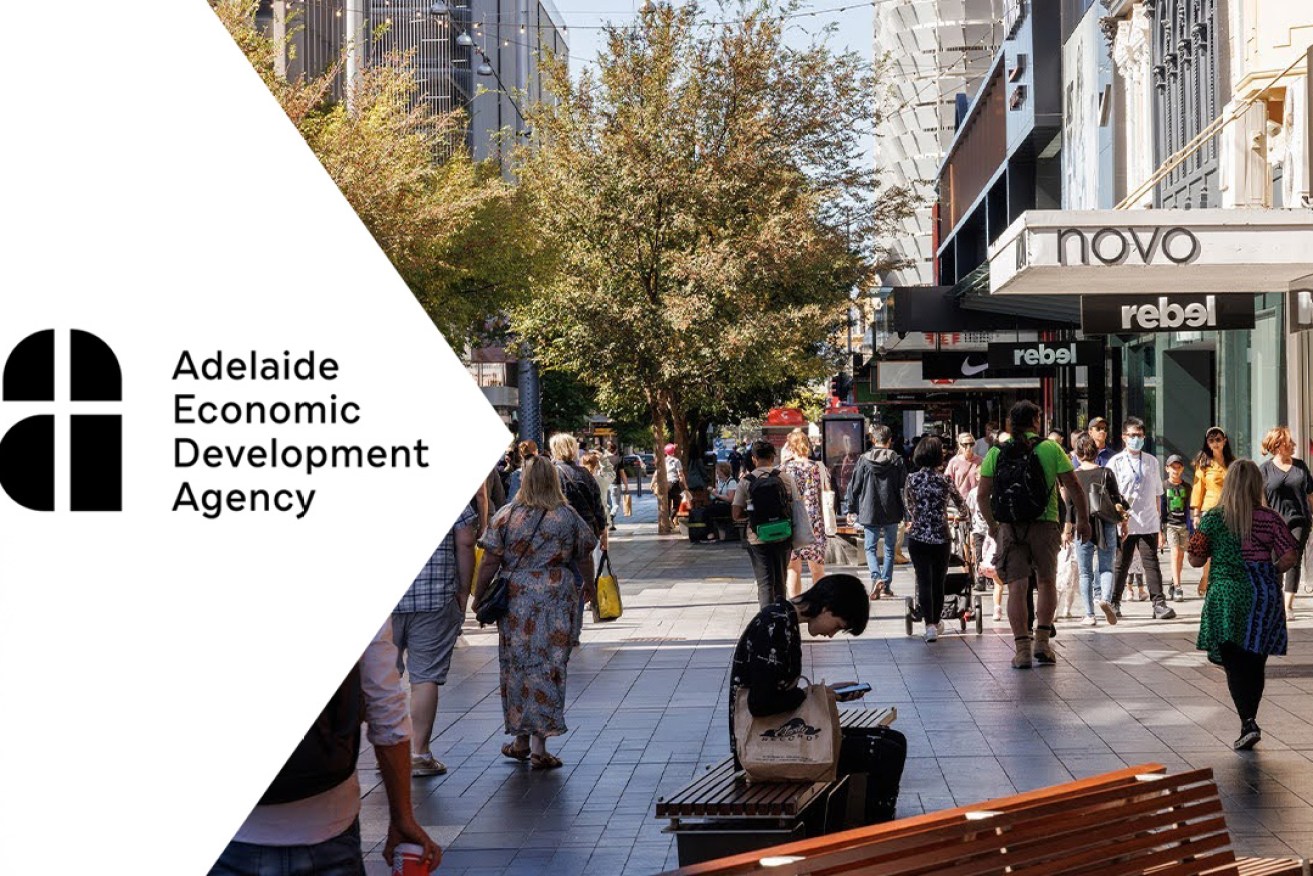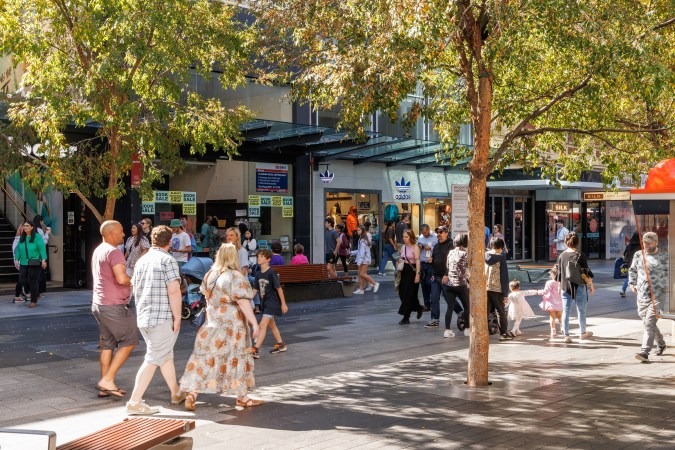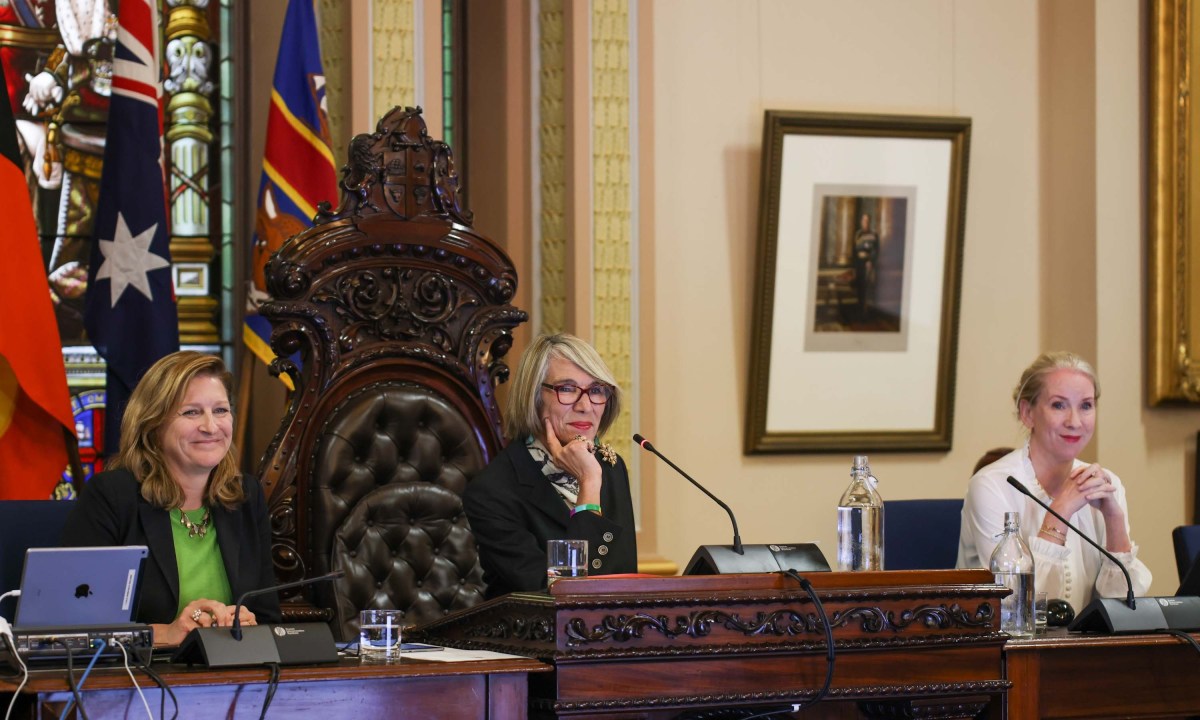‘Warning bells’: Council economic development agency under fire
Adelaide City Council’s economic development agency with an $8m budget has “no clear or consistent process” for justifying grant spending and is “disproportionately” focused on promoting Rundle Mall, an independent review has found.


Right photo: Tony Lewis/InDaily
One of the first actions of the newly elected Adelaide City Council was to commission an independent review of the Adelaide Economic Development Agency (AEDA) in December 2022.
AEDA is a council subsidiary with a 2023/24 budget of just under $8.1 million and 31.6 full time equivalent staff.
Rundle Mall Management, which charges a levy on Rundle Mall traders, also sits within AEDA.
The council under former Lord Mayor Sandy Verschoor created AEDA in October 2020. It started operating in January 2021 with a remit to attract investment, grow Adelaide’s visitor economy, market the city “as a whole” and promote Rundle Mall as “Adelaide’s premier shopping destination”.
But the newly elected council has been more sceptical about the agency and its funding priorities, with councillors regularly questioning AEDA executives in committee meetings about their budget submissions and spending proposals.
Deloitte was contracted to deliver the council review of AEDA, which was commissioned three weeks after AEDA commissioned its own review from KPMG.
The two reviews were released publicly this week.
Deloitte examined 28 “key operational outcomes” of AEDA, marking seven in green (“high level of satisfaction), 17 in yellow (“opportunities for improvement”), and four in red (“to be addressed”).
The four areas marked in red are AEDA’s operating model, management reporting, strategic alignment, and its support of new businesses in “mainstreet precincts” outside of Rundle Mall.
“AEDA were established to be a separate body from CoA (City of Adelaide) to allow agility in decision-making for generating economic opportunities for the city,” the Deloitte review states.
“However AEDA’s governing bodies have been established without a clear strategic direction/economic policy, and are instead functioning more as a delivery arm for Council.
“AEDA are not set up to effectively deliver events, which is resource intensive.”
AEDA currently delivers city events such as WellFest Adelaide, Adelaide Fashion Week and the AEDA Business Summit. Council has given it $600,000 in 2023/24 to administer a “strategic events fund”.
The Deloitte review found precinct groups – incorporated associations that represent traders in different parts of the city – are concerned that areas outside of Rundle Mall are “under-represented in AEDA initiatives”.
“External stakeholders noted that major marketing events typically focus on Rundle Mall, with little noticeable uplift – and in some instances downturn – of economic benefits to other precincts,” the review states.
“Key concerns raised include: promotion is disproportionately focused on Rundle Mall Precinct [and] lack of consultation on grants or precinct initiatives.
“Information flow between AEDA and Precincts is poor, with precinct groups often first finding out about AEDA initiatives through public marketing (without prior consultation).”

CBD precinct groups have raised concerns that AEDA is too focused on Rundle Mall at the expense of other areas. Photo: Tony Lewis/InDaily
Deloitte raised further concerns that there are “no direct reporting lines” between Adelaide City Council CEO Clare Mockler and the AEDA board.
The review found there have been “informal” meetings between council executives and AEDA where “decisions/directives are communicated that remain un-minuted and have bypassed the Board”.
“Internal stakeholder engagements raised concerns that grant acquittal processes are not being appropriately managed, with some organisations receiving multiple allocations for the same outcome,” the review states.
“Currently, the process for evaluating and justifying (e.g. business case process) allocation of grant funding and sponsorships and selecting campaigns is varied. In some instances, it is comprehensive, while in other instances it is not.
“While financial expenditure is required to be approved in line with CoA’s delegations of authority, there is currently no clear or consistent process for adequately justifying this expenditure.”
The Deloitte review said it was an “immediate” priority to develop more clearly defined requirements for justifying AEDA grants, sponsorships and campaigns.
Deloitte were more complimentary about the expertise on the AEDA board, which is led by former Business SA chair Nikki Govan and compromises several South Australian business leaders.
It also criticised Adelaide City Council for not developing an overarching economic strategy for AEDA to work towards.
“The diverse experience and expertise of the AEDA Board members (and their extended networks) was… noted as being important for shaping and delivering activations to successfully promote economic development or residential growth in the CoA,” Deloitte said.
“External stakeholder perception also favoured AEDA’s independence to promote a ‘best for city’ decision-making outlook (i.e. separate from changing political agendas associated with election cycles at the Local and ultimately State and Commonwealth Government levels).”
Meanwhile, the KPMG report commissioned by AEDA is more critical of council.
It attributed problems at AEDA to “red tape” created by council and the late timing of yearly budget approvals.
“The level of ‘red tape’ required for decision making and funding approval for events and sponsorships by both the AEDA Board and Council, is limiting AEDA’s ability to be agile and to quickly adapt to City community needs,” the KPMG report states.
KPMG also found there is a “perceived reluctance of AEDA staff and the elected Council to communicate effectively and work together in a collaborative way”.
“This has caused a breakdown of some relationships between AEDA, the CoA staff, Councillors and key City stakeholders that now needs to be rebuilt,” the report states.
“The negative press and Council Chamber comments on AEDA causes high levels of staff frustration and disappointment.
“Despite this, morale and enthusiasm remains high as staff believe in the model and continue to work hard to deliver the program.”
KPMG found that AEDA is a “successful initiative that provides and capitalises on economic development opportunities for the City of Adelaide”.
InDaily sent a series of questions to AEDA and Lord Mayor Jane Lomax-Smith, via the council’s media advisers, about whether they were committed to implementing the recommendations of the review.
In response, Adelaide City Council CEO Mockler said in a statement: “Yes. Reviews like these are an essential part of good governance and the City of Adelaide and AEDA now has a roadmap of actions to consider implementing in the short term and longer term.”
Asked whether the KPMG review was correct to identify a “breakdown” in relationships between the elected body and AEDA, Mockler said: “I acknowledge the findings and will ensure the City of Adelaide plays its part in strengthening relationships and communication between all parties.”
Mockler also said the council would review how often elected members receive insights from AEDA. Asked whether council had erred in not establishing an overarching economy strategy, she said: “I don’t think Council has erred.”
“I think identifying the need for an economic strategy that aligns with State and Federal economic policy is a positive thing and I look forward to that work being delivered,” she said.
“AEDA has quickly become a trusted agency that has performed well in its service delivery areas.
“Both reviews and recommended actions will only serve to help AEDA do an even better job of supporting our city’s economic growth.”

Lord Mayor Jane Lomax-Smith (centre) and City of Adelaide CEO Clare Mockler (right). Photo: Tony Lewis/InDaily
In a separate statement, AEDA chair Govan said: “I welcome Deloitte’s findings that AEDA is highly valued by the City of Adelaide and external stakeholders, has an agility and degree of freedom that makes it attractive for external stakeholders and its independence is valued – as is the independent skills-based board.”
“The review also highlights potential areas for improvement and, while the Board has not yet had the opportunity to discuss the Deloitte review, we look forward to considering its findings.”
Govan further said AEDA would work to develop an “implementation plan” with council to address the recommendations.
“AEDA has a track record of implementing reviews such as the KPMG review of Rundle Mall Management undertaken in 2021 where all 28 of the identified opportunities have been addressed,” Govan said.
Deputy Lord Mayor Phillip Martin said the Deloitte review identified “significant issues” within AEDA that need to be addressed by council.
“There is clearly a strong regard for the members of the board of AEDA, who have brought a set of skills to the tasks that have been set for them that are admired and respected within the business community and within government,” he said.
“However, there are significant issues identified by the Deloitte desktop inquiry in relation to the relationships between the City of Adelaide and AEDA, the service that AEDA provides to small and medium enterprises (and) the way in which its evolved as an events organiser rather than an economic advisory body.
“But most particularly, there are warning bells – loud warning bells – associated with the governance standards that have been in play since the inception of the organisation.
“These things will need to be dealt with quickly, efficiently and fairly by the elected body in the coming weeks.”
Central ward councillor Carmel Noon said it was important council provided a clearer direction for AEDA’s future direction.
She also said the fact there were two separate reviews commissioned three weeks apart “in itself is testament to inadequate communication processes at the time between the AEDA Board and the City of Adelaide (CoA) Council”.
“I also believe there is a genuine appetite from all parties to ensure that AEDA is sustainable and has a more defined purpose/identity and these independent Reviews will assist in achieving this,” she said in an emailed statement.
“Both Reviews supported the current model/purpose re AEDA driving the City’s economic activity and growth and acknowledged the Agency is trusted by stakeholders including the State Government.
“The success of this model I believe is due to the skills, experience, capability and connections of the AEDA Board with provides enormous benefits to the City of Adelaide.”
AEDA is currently led by acting managing director Greg Ratsch, who has been in the role since inaugural AEDA managing director Ian Hill left the role in January 2021.




